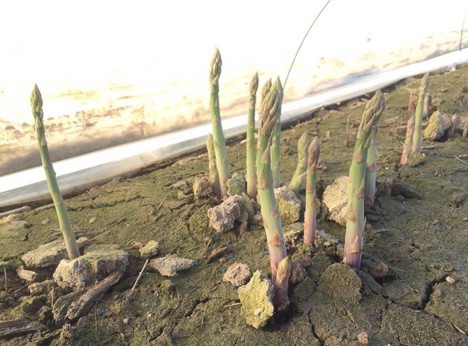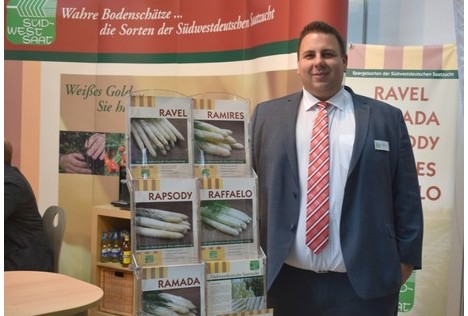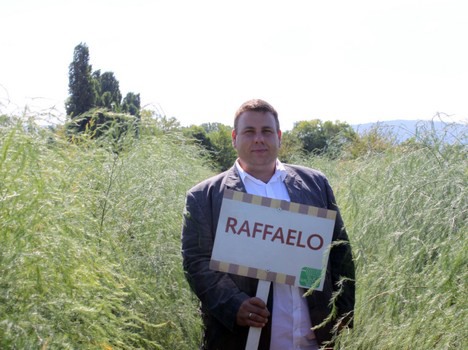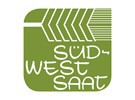The first asparagus -from heated cultivation- of the season has already been harvested. In a few weeks' time, the first vegetables from unheated cultivation will also be available. Every year, this is an exciting time for asparagus growers, because the asparagus market is always on the move - both in the short and long term.
FreshPlaza spoke to Felix Grebhardt, the sales manager of Südwestdeutsche Saatzucht LLC & Co., who is the driving force behind the successful asparagus varieties Ramires and Raffaelo. They spoke about opportunities and challenges in the asparagus sector.

Left: the Raffaelo variety, Right: Ramires
The two innovative white asparagus varieties - Ramires (early) and Raffaelo (late) - complement each other very well. It is now possible to cover almost the entire Central European asparagus campaign, says Grebhardt, who supplies the seeds mainly in Germany and neighbouring countries.
"Our varieties are also becoming increasingly popular in neighbouring Holland. We are pleased that we, as a German breeder, are now also gaining a foothold among asparagus growers in the Netherlands. Dutch asparagus propagation companies have long been important customers for us, and in the past a large proportion of the young plants produced by our varieties were again supplied to Germany. Meanwhile we are also constantly developing new varieties: Interesting varieties are currently being developed and tested in practice, the only question now is when they will actually be launched on the market." The Ramires variety is mainly grown as white asparagus, although it is also suitable for growing green asparagus. So far, however, there are only small areas with green asparagus plantations, as here in Austria. Because of the high proportion of stem-strengthened material, Ramires is now increasingly being planted as a replacement variety for the well-tried early variety Gijnlim.
The Ramires variety is mainly grown as white asparagus, although it is also suitable for growing green asparagus. So far, however, there are only small areas with green asparagus plantations, as here in Austria. Because of the high proportion of stem-strengthened material, Ramires is now increasingly being planted as a replacement variety for the well-tried early variety Gijnlim.
Heated asparagus and green asparagus
Currently the first vegetables from heated cultivation are coming onto the market: the varieties of Südwestdeutsche Saatzucht are also used in this area. "We have already received feedback that the Raffaelo -although it is a late variety- is showing good results in heated cultvation," Grebhardt explains.
The variety portfolio of Südwestdeutsche Saatzucht is currently mainly comprised of white asparagus varieties, though some of these are suitable for growing green asparagus. However, pure green asparagus varieties, especially anthocyanin-free, are a current breeding focus.
"I see increasing potential for green asparagus, and the volumes from domestic cultivation has also increased over the years. However, we have to admit that competition from imported products is simply much greater than for white asparagus, even during the domestic season. As a result, the majority of domestic green asparagus is still sold via direct marketing instead of in food retail outlets."
 Felix Grebhardt at the 2018 expoSE
Felix Grebhardt at the 2018 expoSE
The future: thicker varieties with less excess
As a grower, the company from Rastatt is in direct contact with farmers in the important asparagus-growing areas of Central and North-West Europe and therefore has a good eye on the long-term trends on the market. "The market is clearly tending towards thicker asparagus varieties with a high proportion of stems of between 16-26 mm. In addition, varieties with healthy cabbage are becoming increasingly important, as many plant protection products will be phased out in the near future. We are also well positioned in this respect with our two varieties," says Grebhardt.

Felix Grebhardt in the asparagus field
Finally, the expert observes another trend within cultivation: "In my opinion, it is becoming increasingly important to breed varieties with a low proportion of non-marketable goods. In times of shortage of personnel and high minimum wages, this is very important, because even the harvest of the shares that have to be thrown away or are unsaleable has to be paid for. In the past, attention was mainly paid to the total yield per hectare, but now this is shifting to varieties with a small proportion of non-marketable goods."
For more information:
Südwestdeutsche Saatzucht GmbH & Co. KG
Kontakt: Felix Grebhardt
Im Rheinfeld 1-13 
76437 Rastatt
Tel.: 07222 7707 34
Mobil: 0171 8319729
Fax: 07222 7707 77
[email protected]
www.spargelsorten.de
